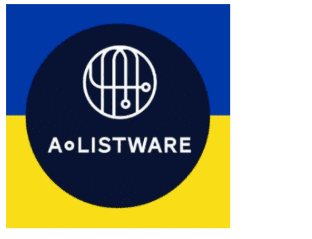So, you want your apps to actually “talk” to each other – and ideally, without bugs, delays, or juggling a dozen tabs. Surprise: it’s not magic. It’s just solid API development. These days, APIs aren’t just the glue holding services together – they’ve become the nervous system of modern digital businesses. Without them, things stall, crash, or just don’t run the way they should. Especially if you’re juggling multiple platforms.
The UK has no shortage of companies offering these services. But we’ve rounded up the ones that actually get it. This list includes firms with all kinds of approaches – some go deep into banking APIs, some combine dev work with long-term support, and others prefer sleek, minimalist integrations. Whether you’re in fintech, e-commerce, healthcare, or just building an internal tool – picking the right API development company could save you months of rewrites and a hundred stress-fueled emails.
1. A-Listware
At A-listware, they’ve spent a lot of time helping teams make their systems communicate better – and API development has become one of the main ways they do that. They are actively working with clients in the United Kingdom, building integrations that aren’t only functional but also practical for daily workflows. Whether it’s connecting internal tools, syncing with external platforms, or ensuring data flows without friction – they concentrate on creating clean and dependable endpoints that make the process smoother.
Their work doesn’t end once the API goes live. They stay involved – designing, deploying, maintaining, and adapting. Their setups run in the cloud, on-premise, or in hybrid environments, depending on what suits the client best. Since they often step into ongoing projects, flexibility is key. Sometimes they support in-house teams, and sometimes they manage everything independently. They’ve built scalable API ecosystems across fintech, healthcare, logistics, and many other sectors, wiring systems together in ways that keep operations running seamlessly.
Key Highlights:
- Offering API-focused solutions via flexible engagement models
- Involvement in projects through infrastructure support and maintenance
- Collaboration with client teams for seamless integration
Services:
- Custom interface development to facilitate data flow and system interoperability
- Remote augmentation of development teams with API expertise
- Cloud-compatible and on-premise API architecture and delivery
- Ongoing API maintenance, security updates, and lifecycle support
Contact Information:
- Website: a-listware.com
- Email: info@a-listware.com
- Facebook: www.facebook.com/alistware
- LinkedIn: www.linkedin.com/company/a-listware
- Address: St. Leonards-On-Sea, TN37 7TA, UK
- Phone Number: +44 (0)142 439 01 40
2. DSP
DSP takes a structured, tech-first approach when it comes to building interconnected systems. Their focus is often on getting different platforms to work together behind the scenes, whether that means supporting digital banking architecture, creating tailored software, or stitching services together through custom-built APIs. The work isn’t always visible, but it’s what keeps digital operations from falling apart under pressure. They tend to work with finance and public sector clients, where stability and compliance are just as important as the code itself.
What makes their API development stand out is how tightly it’s tied into broader systems thinking. Instead of just building isolated functions, they design the APIs to sit comfortably within more complex digital frameworks. That might involve integrating with legacy setups or streamlining how data flows between applications. They’ve also spent time refining cloud migration strategies, and APIs play a major role in that – serving as the connective tissue between on-prem and cloud-based services.
Highlights:
- Deep experience working with financial services platforms
- Focus on long-term architecture planning and integration
- Strong use of APIs for connecting cloud and legacy systems
Services cover:
- API engineering for financial operations
- Data flow automation via custom API layers
- Integration between legacy infrastructure and new apps
- Backend connectivity for digital platforms and services
Get in touch:
- Website: www.dsp.co.uk
- E-mail: enquiries@dsp.co.uk
- Twitter: x.com/dsp_uk
- LinkedIn: www.linkedin.com/company/dspglobal
- Address: 70 Gracechurch Street, London EC3V 0HR
- Phone: +44 (0)203 880 1686
3. IDS Logic
IDS Logic leans into technical services that help businesses bridge platforms, automate functions, and manage systems from behind the curtain. Their API-related work comes through in areas like custom middleware, mobile backend services, and systems integration. Often, their involvement begins when a company hits a bottleneck – too many tools, not enough coordination – and needs something that makes all the parts click together. Their development teams support both greenfield API builds and modernization of existing frameworks.
A lot of what they do happens around e-commerce and content-heavy platforms. That means developing APIs that power online storefronts, sync with CRMs, or connect content management systems with third-party tools. It’s not just about writing endpoints – it’s about designing something that fits with the client’s business logic, and doesn’t break under user load. The goal seems to be building things that run smoothly even when no one’s watching.
Key points:
- Strong technical depth in e-commerce infrastructure
- Focus on CMS, CRM, and payment system integrations
- API work aligned with real-time data exchange
Services include:
- Custom API builds for online stores and portals
- Integration of CMS platforms through REST APIs
- API-based middleware for back-office systems
- Connector services for payments, logistics, and CRM platforms
Contact info:
- Website: www.idslogic.co.uk
- E-mail: info@idslogic.co.uk
- Facebook: www.facebook.com/idslogic
- LinkedIn: www.linkedin.com/company/ids-logic-uk
- Instagram: www.instagram.com/idslogic
- Address: 7 Commercial Street, Morley, Leeds, LS27 8HX, UK
- Phone: +44 (0)1135 316 314
4. Macro Global
Macro Global operates at the intersection of fintech and software services, particularly within regulatory and banking environments. Their solutions tend to be built for high-stakes use cases like risk reporting or cross-border compliance, and APIs play a foundational role in making that work. Rather than treating APIs as standalone tools, they embed them deeply into broader product ecosystems – systems that pull from multiple data sources and need to work without delays or downtime.
Their projects often involve stitching together data from different silos – think KYC platforms, core banking systems, and regulatory databases. That calls for API development that’s not just functional, but bulletproof when it comes to reliability and format. Their engineering teams focus on building these links so that data flows securely and in real time, often under specific compliance requirements. In short, API development here isn’t about making things flashy – it’s about making them dependable.
What they do well:
- Specialization in regulatory and compliance software
- Strong use of APIs for secure cross-platform data access
- Focus on fintech architecture and financial system logic
Services:
- Secure API layers for regulatory and banking systems
- Integration frameworks across compliance platforms
- Real-time connectors for KYC and risk systems
- Data orchestration through embedded API services
Reach out via:
- Website: www.macroglobal.co.uk
- E-mail: salesdesk@macroglobal.co.uk
- Facebook: www.facebook.com/macroglobal.co.uk
- Twitter: x.com/MacroGlobalUK
- LinkedIn: www.linkedin.com/company/macro-global-uk
- Address: 25, Cabot Square, Canary Wharf, London – E14 4QZ
- Phone: +44 (0)204 574 2433
5. Identify Digital
Identify Digital builds out digital products that are less about fancy visuals and more about making platforms actually talk to each other. Their work typically involves connecting websites, CRMs, booking systems, and other business-critical tools using tailor-made development. API work shows up in the way they handle data passing between customer-facing sites and backend platforms. Instead of relying on generic plug-ins, they often go for custom API builds that are aligned to business operations, so things don’t break the minute traffic spikes or a system changes.
The company’s strength seems to lie in its ability to work through messier technical setups. That could mean dealing with legacy software, third-party services, or applications that were never designed to integrate smoothly in the first place. APIs become the bridge – custom-built connectors that carry the logic and structure needed to make everything sync, both in real-time and over longer usage cycles. It’s the kind of work that doesn’t always get noticed but tends to keep systems running without manual intervention.
Strengths:
- Focus on integration between websites and internal platforms
- Projects frequently involve complex business workflows
- Strong emphasis on system communication via custom-built solutions
What they offer:
- API architecture for website-to-system communication
- Development of integration layers for internal tools
- Custom endpoints for data-driven customer platforms
- Workflow automation through backend API solutions
Contact:
- Website: identifydigital.co.uk
- E-mail: enquiries@identifydigital.co.uk
- LinkedIn: www.linkedin.com/company/identify-digital
- Address: 5 The Office Campus, Paragon Business Park, Wakefield, WF1 2UY
- Phone: 01924 911333
6. Crowers
Crowers operates on the development side of digital infrastructure, with a focus that includes both front-end presentation and behind-the-scenes mechanics. Their approach tends to include setting up how applications communicate, with APIs often at the heart of it. Whether it’s pulling data from a third-party platform or syncing user actions with a CMS, much of their build work depends on custom interfaces that allow systems to share data without lag or duplication.
Instead of sticking to just web design, they work further down the stack. That includes scripting out APIs that handle account logins, pulling in user data, or integrating form submissions directly into external systems. For businesses running on tools like HubSpot or Salesforce, Crowers builds those missing links that let platforms speak fluently and securely. Their API development is typically aimed at solving bottlenecks that slow down either the user experience or internal operations – sometimes both.
What makes them stand out:
- Project scope includes full-stack and systems-level development
- Integration support for tools like CRMs and marketing platforms
- Development includes user-side and backend API functions
Their focus areas:
- Custom API scripting for third-party tool integration
- Data syncing solutions between web forms and backend systems
- Platform automation through middleware API services
- Authentication and user session logic via secure API endpoints
Contact:
- Website: crowers.co.uk
- E-mail: team@crowers.co.uk
- Twitter: x.com/CrowersDigital
- LinkedIn: www.linkedin.com/company/crowers
- Address: Red Barns Ashwell Road, Guilden Morden Cambridgeshire SG8 0JY U.K.
- Phone: +44 (0) 1223 656 808
7. API Guy
API Guy is all-in on interface-driven development – not the visual kind, but the kind that connects platforms under the hood. This is a technical outfit that concentrates specifically on APIs as the backbone of system communication. The services here revolve almost entirely around writing, documenting, testing, and supporting APIs – particularly RESTful services. From custom builds to maintaining existing interfaces, the company works with the sort of detailed attention that’s needed when businesses rely heavily on software talking to other software.
The scope of their work covers a full cycle – from strategy to implementation to long-term support. They help teams design APIs from scratch, handle versioning when things evolve, and provide tooling that ensures endpoints stay functional under pressure. There’s also support for API-first architecture, which means systems are built with integration in mind from day one, not added on later as a patch. It’s a focused, practical take on what makes digital systems truly flexible and scalable.
What they’re good at:
- Exclusive focus on API architecture and integration
- Supports RESTful interface design and lifecycle management
- Detailed attention to documentation and endpoint stability
Their services include:
- REST API development with structured endpoint planning
- Maintenance and updates for existing API ecosystems
- Documentation and tooling for development teams
- Version control and scaling support for multi-system connections
Get in touch:
- Website: apiguy.co.uk
- E-mail: info@apiguy.co.uk
- Facebook: www.facebook.com/APIGuy.UK
- Twitter: x.com/APIGuy_UK
- LinkedIn: www.linkedin.com/company/apiguy
- Address: Oban Close Tingley, Wakefield / Leeds, England, WF3 1JU
8. Gravitee
Gravitee is centered around helping businesses shape how their systems connect, communicate, and evolve. The company builds open-source tools that support both designing and managing APIs, which is a fancy way of saying they help digital platforms speak the same language. What stands out is their approach to full lifecycle API management – starting from designing, securing, deploying, to monitoring APIs in real time. The platform comes in modular pieces, so you can pick what fits your setup without being forced into a single rigid stack.
Rather than just offering a dashboard and calling it a day, the team has invested in features like asynchronous APIs and event-native capabilities. This makes it easier to build systems that aren’t only reactive, but also proactive. If you’re looking to stitch together different tools or create your own integrations without losing sleep over scalability or traffic spikes, that’s the sort of territory where Gravitee operates. Their work often intersects with banking, telecom, and industries where reliability isn’t optional.
Why they’re worth a look:
- Focus on event-driven architecture and asynchronous APIs
- Modular platform design with flexible deployment options
- Support for both REST and streaming API protocols
Services include:
- API platform engineering across the full lifecycle
- Design and deployment of synchronous and asynchronous APIs
- Security layer implementation for APIs with policies and access control
- Traffic monitoring, analytics, and observability tools for APIs
Reach out:
- Website: www.gravitee.io
- Facebook: www.facebook.com/GraviteeSource
- Twitter: x.com/graviteeio
- LinkedIn: www.linkedin.com/company/gravitee-io
- Instagram: www.instagram.com/gravitee.io
- Address: England, 20 Little Britain London, EC1A 7DH
9. DataArt
DataArt operates as a custom software engineering firm that steps into complex environments where multiple systems need to talk to each other without breaking. Their development work frequently revolves around APIs – not just building them, but shaping how digital services depend on them. Instead of creating one-size-fits-all solutions, the team adapts their process to each client’s tech stack and business logic, which often means tailoring APIs to fit unique backend and frontend demands.
They’ve done a considerable amount of work in healthcare, finance, travel, and media – industries where interoperability isn’t just a bonus but a necessity. Through collaboration with internal teams, they help organize system architecture and ensure APIs do more than just transfer data; they help move entire workflows. Whether it’s integrating with legacy databases or modern SaaS tools, their work tends to orbit around making sure APIs run quietly in the background – without surprises.
Standout qualities:
- Cross-domain experience in sectors like finance and healthcare
- Hands-on approach to both backend and frontend API integration
- Involvement in long-term system modernization projects
What they offer:
- Custom API development aligned with business workflows
- Integration of APIs with legacy and modern systems
- API testing and documentation to support scalability
- Architecture consulting focused on microservices and API gateways
Contact info:
- Website: www.dataart.com
- E-mail: hr-uk@dataart.com
- Facebook: www.facebook.com/DataArt
- Twitter: x.com/DataArt
- LinkedIn: www.linkedin.com/company/dataart
- Address: 55 King William Street, 3rd floor, London, EC4R 9AD
- Phone: +44 (0) 20 7099 9464
10. One Beyond
One Beyond works at the intersection of enterprise software and day-to-day practicality. Their projects often revolve around stitching systems together – whether it’s an old CRM, a cloud platform, or something proprietary and obscure. In that context, API development isn’t a side service, it’s the foundation. The company designs custom APIs that make systems interoperable, secure, and future-ready, allowing businesses to automate data flows and cut out repetitive manual processes.
Their method tends to be iterative, with clients involved at every step – from requirements gathering to deployment. This leads to APIs that are well-documented and built for real-world usage, not just for passing internal code reviews. They also lean heavily into .NET and Azure environments, often tailoring APIs for integration with Microsoft-based infrastructure. That kind of specificity gives them an edge in scenarios where precision and compatibility matter more than flash.
What they focus on:
- Emphasis on long-term maintainability of custom APIs
- Strong alignment with Microsoft technologies and Azure environments
- In-house teams handling development from concept to release
Services include:
- API architecture design for scalable enterprise systems
- Custom-built APIs tailored for cloud and on-prem environments
- Integration services connecting disparate platforms and services
- Ongoing API maintenance, versioning, and technical documentation
Get in touch:
- Website: one-beyond.com
- E-mail: contact@one-beyond.com
- Facebook: www.facebook.com/OneBeyondSoftware
- Twitter: x.com/OneBeyond_
- LinkedIn: www.linkedin.com/company/onebeyond
- Address: 33 Glasshouse Street, London, W1B 5DG
- Phone: 020 3096 6199
11. Intellectsoft
Intellectsoft tends to step into projects where software isn’t just about building something new but about getting existing systems to play nicely. The team often works with companies sitting on scattered data or legacy systems, helping connect them through APIs that don’t fall apart under pressure. A lot of the focus is on crafting custom software with integration at the core, so businesses don’t have to rebuild from scratch. It’s more like giving their systems the wiring they should’ve had in the first place.
Their engineers don’t just write endpoints and call it done – they spend time figuring out what’s happening behind the scenes. Whether it’s dealing with third-party SaaS tools or internal platforms that are barely documented, the team usually ends up designing APIs that smooth over the gaps. You’ll also find a decent mix of enterprise clients in their portfolio, which usually means higher stakes, heavier loads, and stricter requirements for security and scaling.
Why people choose them:
- Strong technical orientation in enterprise software integration
- Experience bridging legacy platforms with cloud-based tools
- Flexible involvement across product lifecycle stages
Core offerings:
- Design and development of custom APIs for system communication
- Integration of third-party services into existing software environments
- API lifecycle management including testing, monitoring, and scaling
- Support for microservices-based architecture using robust API layers
Contact:
- Website: www.intellectsoft.net
- E-mail: info@intellectsoft.net
- Facebook: www.facebook.com/Intellectsoft
- Twitter: x.com/Intellectsoft
- LinkedIn: www.linkedin.com/company/intellectsoft
- Address: 500 Fashion Ave Fl 8A New York City NY 10018, USA
- Phone: +44 20 3887 0078
12. Vention
Vention approaches development with a focus on long-term scalability. A lot of their work revolves around modernizing infrastructure and setting up systems that are more adaptable – often through carefully built APIs that bring different technologies under one roof. When businesses start pulling together data from multiple platforms, Vention steps in with architecture and dev support that makes the whole process less chaotic.
Their engineers have worked on integrations that span mobile, web, and backend systems, which means the APIs they build aren’t limited to one environment. It’s not unusual for them to design interfaces that connect AI modules, analytics tools, and client dashboards all at once. The process usually starts with discovery and continues through release, including things like documentation and load testing – especially important in sectors like fintech or healthtech, where failure isn’t just inconvenient.
Why they stand out:
- Focus on scalable system design and modular architecture
- Involvement in both greenfield and modernization projects
- Experience integrating AI and machine learning pipelines via APIs
They offer:
- Development of APIs for seamless data flow across systems
- API integration for web, mobile, and backend layers
- Interface optimization for secure access and performance tuning
- End-to-end delivery of API solutions including QA and release support
Contact:
- Website: ventionteams.com
- E-mail: hello@ventionteams.com
- Twitter: x.com/ventionteams
- LinkedIn: www.linkedin.com/company/ventionteams
- Instagram: www.instagram.com/ventionteams
- Address: London, 30 Churchill Place, E14 5RE
- Phone: +44 207 117 28 42
13. Digiryte
Digiryte focuses on building useful software rather than chasing buzzwords. The work spans SaaS products, custom apps, APIs, websites, and the cloud and data layers that make the whole stack hold together. On delivery projects, the team leans on API-driven architectures so web apps stay fast, modular, and easy to extend as needs change. That approach pairs well with early roadmap support and technical architecture planning, so interfaces aren’t an afterthought bolted on late in the game.
Product work rarely stops at a first release. Digiryte runs from quick prototyping and MVPs into full product development, then helps scale what proves its value. Alongside that, data engineering and broader digital transformation support show up when platforms need to talk to each other cleanly and reliably. The end result is predictable delivery: smaller services, clearer contracts, and less surprise when something changes upstream.
What makes them unique:
- API-driven architectures used for modern web application builds
- Product lifecycle coverage from discovery to scaling
- Emphasis on technical roadmaps and architecture before heavy build
What they do:
- Custom API design and implementation for web and mobile products
- Integration of third-party services and platforms
- Web application development using API-driven architectures
- MVP creation, product development, and post-launch scaling
- Cloud and data engineering to support API performance and reliability
Get in touch:
- Website: www.digiryte.com
- E-mail: hello@digiryte.com
- Facebook: www.facebook.com/digiryte
- Twitter: x.com/digiryte
- LinkedIn: www.linkedin.com/company/digiryte
- Instagram: www. instagram.com/digiryte
- Address: Blue Tower, MediaCityUK, Salford, M50 2ST Greater Manchester, England, UK
- Phone: +44 (0) 161 706 7983
14. Magora
Magora takes a hands-on approach to building digital tools that actually do something useful – whether that’s connecting platforms, syncing user data, or making sure systems don’t break when users click the wrong button. A big part of what they do involves crafting custom software, but the real glue that holds everything together? That’s often the APIs. Their work focuses a lot on enabling products to interact smoothly with other services, which means planning out how data moves, what logic sits between systems, and how the whole structure stays reliable even as the product scales.
They’ve worked with businesses in finance, healthcare, retail – you name it – and that means the APIs need to follow real-world logic, not just clean code structure. Often, it’s about creating a foundation that other developers can build on, without worrying that pulling one thread will unravel the whole thing. That kind of thinking shows up in the way they document and maintain their APIs, making sure endpoints make sense both for machines and the people reading the documentation at 2am during a system failure.
Why they’re worth checking out:
- Focus on robust data communication between systems
- Experience designing APIs that handle high-load user environments
- Work spans industries with complex integration requirements
Their focus areas:
- Design and implementation of server-side API structures
- Integration of third-party services into enterprise software
- Custom backend development to support dynamic frontend systems
- Ongoing API support, versioning, and endpoint optimization
Contact info:
- Website: magora-systems.com
- E-mail: info@magora.co.uk
- Facebook: www.facebook.com/magora.systems
- Twitter: x.com/magora_systems
- LinkedIn: www.linkedin.com/company/magora
- Instagram: www.instagram.com/magora_team
- Address: Office 4.01, 4th Floor The Tea Building, 56 Shoreditch High St London E1 6JJ
- Phone: 020 7183 5820
15. GoodCore
GoodCore focuses on building and wiring APIs so products talk to each other without drama. Project work ranges from designing new interface layers to stitching together third-party services and internal systems, often to get data out of silos and into useful flows. The team publishes practical guidance on topics like how to design robust interfaces, when to use vendor APIs in sectors such as travel or healthcare, and what it takes to keep integrations reliable over time. The overall pattern is straightforward: plan the contracts, implement the endpoints, and make sure the surrounding systems can actually use them day to day.
On delivery, API work shows up alongside larger builds – web apps, mobile products, portals – so the interface layer doesn’t get bolted on at the last minute. Typical scope includes enterprise system integration, data aggregation from multiple sources, and payments-related connections when a product needs to handle transactions. Case studies describe industry-specific interface development, while service pages for web and mobile make it clear that integration is a first-class part of the toolkit. It’s methodical rather than flashy, which is often what keeps live systems stable.
Why people like them:
- Custom interface design and system integration used to unify products and data flows
- Published how-to resources on building and integrating APIs across domains
- Work examples include industry-specific interface development for real-world platforms
Services include:
- Custom API design and development
- Enterprise system integration
- Data integration and aggregation from multiple sources
- Third-party API integration
- Payment gateway and financial API connections
- API integration for web and mobile applications
Reach out:
- Website: www.goodcore.co.uk
- E-mail: contact@goodcore.co.uk
- Facebook: www.facebook.com/goodcoresoftware
- LinkedIn: www.linkedin.com/company/goodcore-software
- Address: Airport House, Purley Way, Croydon CR0 0XZБ, UK
- Phone: 020 8781 6903
Wrapping It All Up
APIs aren’t just how systems connect – they’re part of the underlying infrastructure that keeps things moving inside any digital business. The more services and data you juggle, the more it matters how those pieces talk to each other. That’s why choosing the right API development partner isn’t just about writing code. It’s about understanding business logic, technical nuances, security, and how to build something that actually scales. Pick the wrong partner, and you end up with fragile connections that hold everything back.
In this article, we’ve put together companies that actually get how integration works in the real world – with shifting deadlines, legacy systems, and moving requirements. Some focus on banking systems. Others plug APIs into e-commerce flows. Some build the architecture from the ground up. They work differently, sure – but they all know how to craft strong, logical connections between your systems.





































